THE ULTIMATE ‘PROOF OF PAIN’
“The Lord giveth and the Lord taketh away.” He certainly doth in the Book of Job. In this brief but telling chronicle, a catalogue of catastrophes is visited on the title character. The faith of Job, a stalwart soul from the “land of Uz,” is tested and triumphs—for better or worse. In 1958 this Old Testament cautionary tale of piety under fire became the verse play J.B. Winner of the Pulitzer Prize and Tony Award for best play, the two-act reimagining by Archibald MacLeish updated the Biblical saga to a present-day circus tent. Under this “small top” a recurring bet between good and evil gets enacted over and over.
It is again—in Brian Pastor’s excellent revival at City Lit, performed appropriately in the Edgewater Presbyterian Church. In this remount all 23 characters are played by nine actresses over the age of 55. It’s a sterling—and successful—opportunity for superb performers to tackle roles not otherwise available that showcase their skills and chops.
Much like the fanciful “heaven” scene in Carousel, MacLeish’s playful and presentational treatment attempts to lighten dark doings, in this case the most unrelenting tragedy in holy writ. It comes down to a wager between two vaudevillian vendors—Mr. Zuss (Elaine Carlson), standing in for Zeus or God and meaning “sweet” in German, and Nickles (Morgan McCabe), his moniker an allusion to “Old Nick,” alias the Devil.
 Incensed when he overhears J.B., a bystander businessman (Stephanie Monday), bragging that his success is a reward for his righteousness, Nickles dismisses this, to him, false devotion. He cynically argues that, given enough affliction, this self-inflated true believer would “curse God and die” (as in commit suicide). “We learn to wish we never lived.” But for Zuss, “God is only seen from the ashes” and “There is no comfort but the fear of God.” Game on.
Incensed when he overhears J.B., a bystander businessman (Stephanie Monday), bragging that his success is a reward for his righteousness, Nickles dismisses this, to him, false devotion. He cynically argues that, given enough affliction, this self-inflated true believer would “curse God and die” (as in commit suicide). “We learn to wish we never lived.” But for Zuss, “God is only seen from the ashes” and “There is no comfort but the fear of God.” Game on.
With Zuss’s refusing to intervene and thumping a drum at each misfortune, Nickles, the “Father of Lies,” is allowed to punish J.B.’s purity. He kills off one son in war and other children in a pointless car crash, then snares the parents in scandal when they react in sheer shock. For reasons that escape them, J.B. and his wife Sarah (Judy Lea Steele) lose their fortune and home. Unhinged by these horrors, Sarah questions any providence that could punish those who committed no crimes. How long can this once prosperous banker trust in the Lord?
Desperate to know what an upright man has done to deserve this gratuitous suffering, J.B. appeals to three friends or “comforters,” representing science, history and religion. For the first, J.B.’s privations are undeserved because, a mere victim of unstoppable circumstances, he has no will and thus no guilt. Denying any illusion of innocence, History minimizes his “unintelligible” agony, saying it shrinks to nothingness in the “big picture” of centuries of sorrow. Religion, the most intractably unforgiving counselor, snarls that J.B. is paying for humankind’s original sin: His guilt is prior proof of his need to bleed.
Unhappy with these half-answers, by the end J.B. remains unrestored (unlike the original), other than to be reunited with a broken Sarah. He can only fall back on another gratuitous force, their unconditional love. “Take the evil with the good” is his resigned response. It inevitably recalls Voltaire’s Candide and Cunegonde abandoning the lies of Pangloss’ optimism in order to “cultivate our garden.”
Not even the most fulsome synopsis can do justice to MacLeish’s dense and dark poetic dialogue, its increasingly intense imagery sometimes incoherently gnarled and convoluted. Belabored but beautiful, that electric and repetitious wordplay, more than any theological disputations, is the payoff in this play.
It’s well handled by Pastor’s exemplary cast, which also include Rainee Denham, Susie Griffith, Barbara Roeder Harris, marssie [sic] Mencotti, and Shariba Rivers. Carlson, McCabe, Steele, and especially Monday’s devastated title character, an avid questioner of destiny, speak difficult lines with disarming ease. David Knezz’ masks add vibrant art to MacLeish’s indictments and accusations.
A modern morality play worth a second coming, J.B. righty questions whether any luck is truly earned and excoriates the ugly relativity of fate. This litany of grief and woe is as anachronistic as Dorothy Parker’s deathless quip, “What fresh new hell approaches?” How we cope with calamity—defiance or resignation to irresistible or avoidable injustice—is a test that life refuses not to administer. You can take it here—from a safe distance.
photos by Tom McGrath
J.B.
City Lit
Edgewater Presbyterian Church
1020 West Bryn Mawr Ave.
ends on December 10, 2017
for tickets, call 773.293.3682 or visit City Lit
for more shows, visit Theatre in Chicago

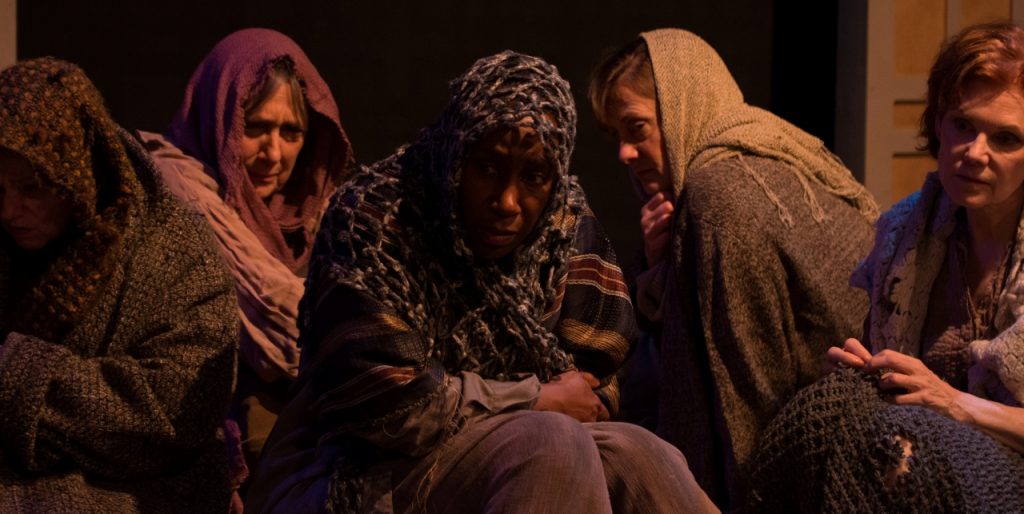
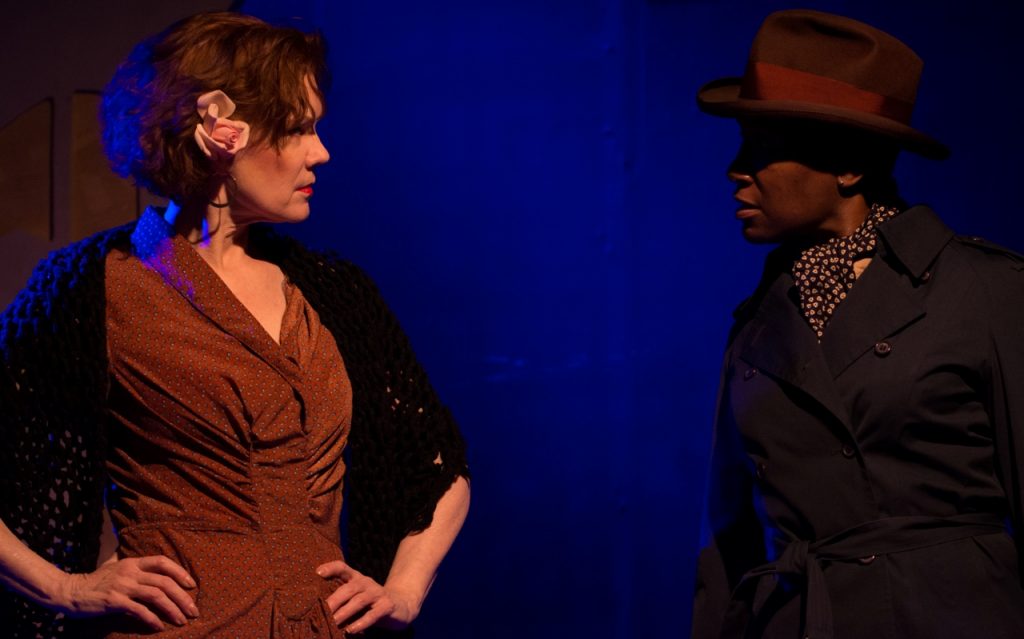
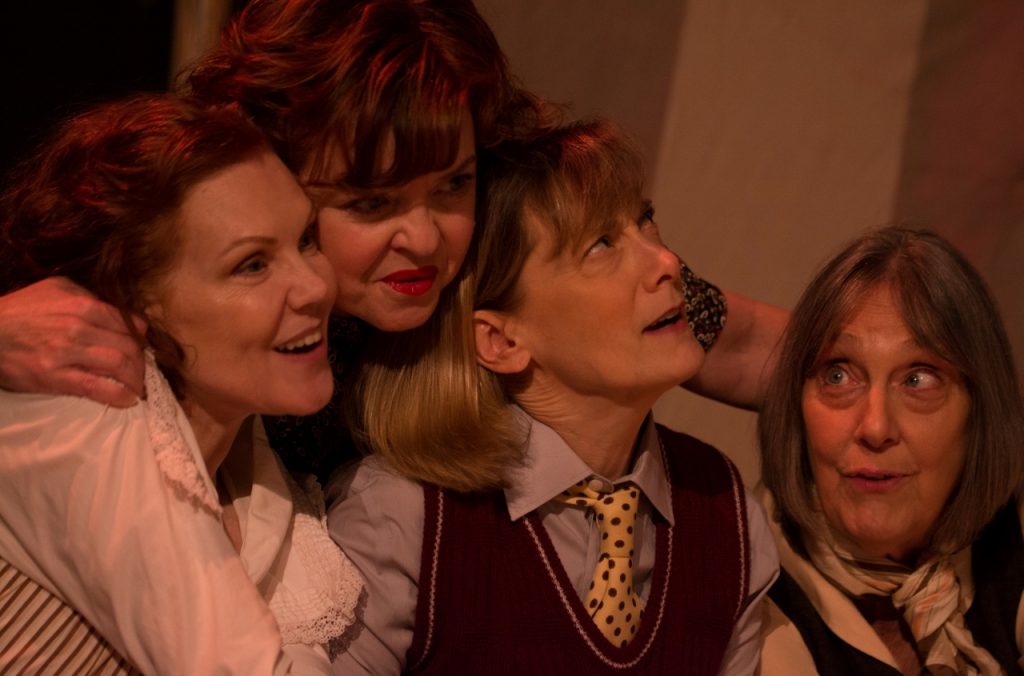
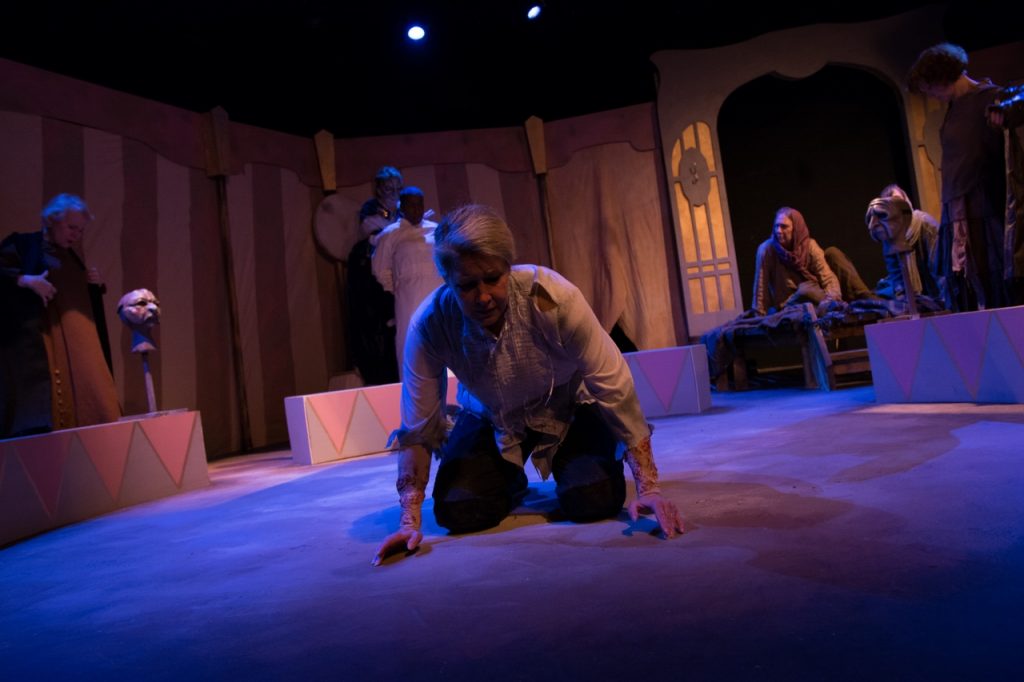
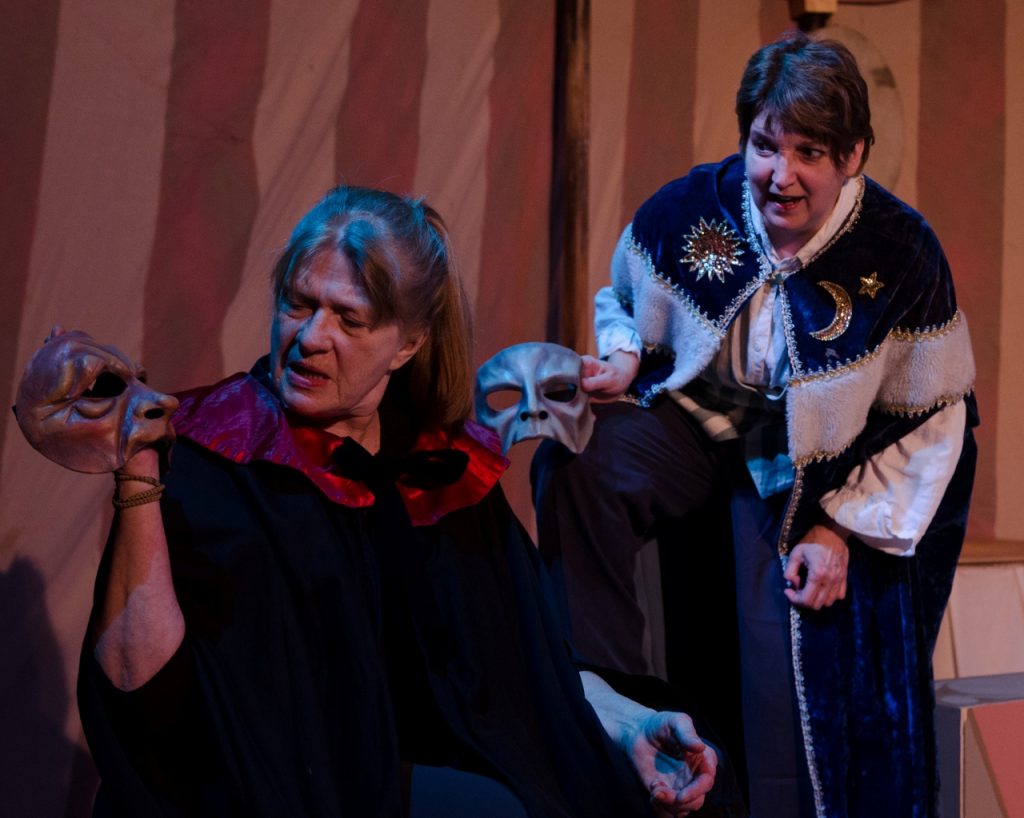

{ 1 comment… read it below or add one }
I believe you mean “labored” not “belabored.”